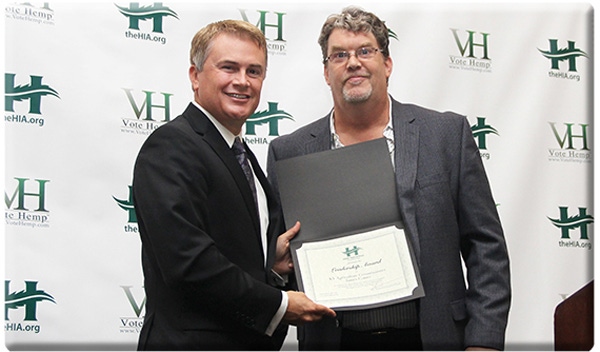October 14, 2015

Industrial hemp will cover tens of thousands of acres and generate thousands of jobs in Kentucky in the near future, Kentucky Agriculture Commissioner James Comer told hundreds of hemp growers, processors and enthusiasts at the Hemp Industries Association Conference in Lexington.
“In the future, I think we’re going to go from 1,700 acres to 10,000 acres to 20,000 acres to 40,000 acres” of industrial hemp planted in Kentucky, Comer said. “This is going to be a big crop in the state of Kentucky. We’re going to go from 24 processors to hopefully 100 processors. We’re going to be making things that range from parts in the automotive industry to parts in the construction industry to pharmaceuticals. [Kentucky] is going to be the epicenter of industrial hemp production in America.”
In an address interrupted numerous times by applause, Comer credited U.S. Sens. Mitch McConnell and Rand Paul, U.S. Reps. Thomas Massie and John Yarmuth, all of Kentucky, and Kentucky state Sen. Paul Hornback for supporting federal and state legislation that opened the door for Kentucky’s industrial hemp pilot projects.
The Kentucky Department of Agriculture approved 121 industrial hemp pilot projects submitted by 24 processors, seven universities, and numerous individual growers totaling more than 1,700 acres of intended plantings for 2015, Comer told the audience of hemp supporters from across the nation. He said Kentucky universities are recruiting students from other states and countries because they want to research hemp.
Comer said industrial hemp still encounters obstacles from federal and state government. “We’re going to keep working to try to have open dialogue with these government bureaucracies and hope that we can continue to make progress and continue to grow the industry,” Comer said.
Find out more about the Hemp Industries Association.
The Kentucky Department of Agriculture will post the application for 2016 industrial hemp pilot projects in Kentucky in October.
The industrial hemp pilot projects are conducted under a provision of the 2014 farm bill that authorizes projects in states such as Kentucky where hemp production is legal under state law. The Kentucky General Assembly in 2013 passed a state law creating a regulatory framework for hemp production in Kentucky as the result of Commissioner Comer’s bipartisan campaign in support of the legislation. Upon taking office in January 2012, Commissioner Comer revived the Kentucky Industrial Hemp Commission after a 10-year hiatus and served as its first chairman.
Kentucky's first hemp crop was grown in 1775, and Kentucky went on to become the nation's leading hemp-producing state in the mid-19th century with peak production of 40,000 tons in 1850. U.S. hemp production declined after the Civil War, and for several decades almost all of the nation's hemp was grown in the Bluegrass region of Kentucky.
Federal legislation passed in 1938 outlawed production of cannabis, including hemp, in the U.S. Hemp production in Kentucky and the U.S. ramped up during World War II as part of the war effort but fell again after the war and ended with the demise of a small hemp fiber industry in Wisconsin in 1958.
You May Also Like




